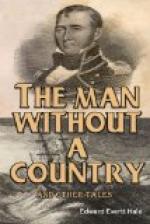I was frightened to death by his calm, hard passion, but I blundered out, that I would, by all that was holy, and that I had never thought of doing anything else. He hardly seemed to hear me; but he did, almost in a whisper, say: “O, if anybody had said so to me when I was of your age!”
I think it was this half-confidence of his, which I never abused, for I never told this story till now, which afterward made us great friends. He was very kind to me. Often he sat up, or even got up, at night, to walk the deck with me, when it was my watch. He explained to me a great deal of my mathematics, and I owe to him my taste for mathematics. He lent me books, and helped me about my reading. He never alluded so directly to his story again; but from one and another officer I have learned, in thirty years, what I am telling. When we parted from him in St. Thomas harbor, at the end of our cruise, I was more sorry than I can tell. I was very glad to meet him again in 1830; and later in life, when I thought I had some influence in Washington, I moved heaven and earth to have him discharged. But it was like getting a ghost out of prison. They pretended there was no such man, and never was such a man. They will say so at the Department now! Perhaps they do not know. It will not be the first thing in the service of which the Department appears to know nothing!
There is a story that Nolan met Burr once on one of our vessels, when a party of Americans came on board in the Mediterranean. But this I believe to be a lie; or, rather, it is a myth, ben trovato, involving a tremendous blowing-up with which he sunk Burr,—asking him how he liked to be “without a country.” But it is clear from Burr’s life, that nothing of the sort could have happened; and I mention this only as an illustration of the stories which get a-going where there is the least mystery at bottom.
So poor Philip Nolan had his wish fulfilled. I know but one fate more dreadful; it is the fate reserved for those men who shall have one day to exile themselves from their country because they have attempted her ruin, and shall have at the same time to see the prosperity and honor to which she rises when she has rid herself of them and their iniquities. The wish of poor Nolan, as we all learned to call him, not because his punishment was too great, but because his repentance was so clear, was precisely the wish of every Bragg and Beauregard who broke a soldier’s oath two years ago, and of every Maury and Barron who




